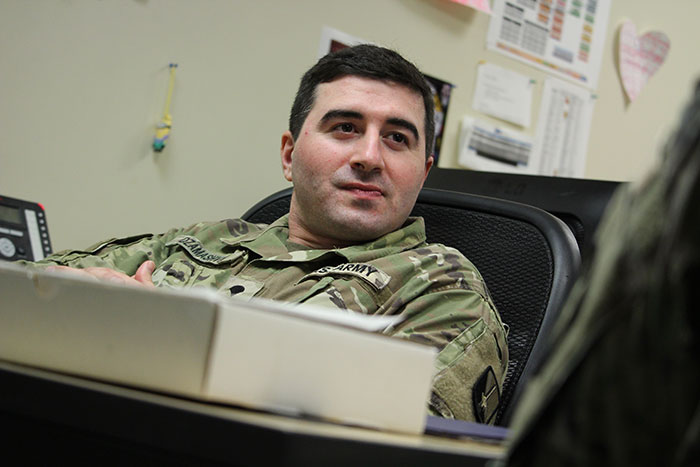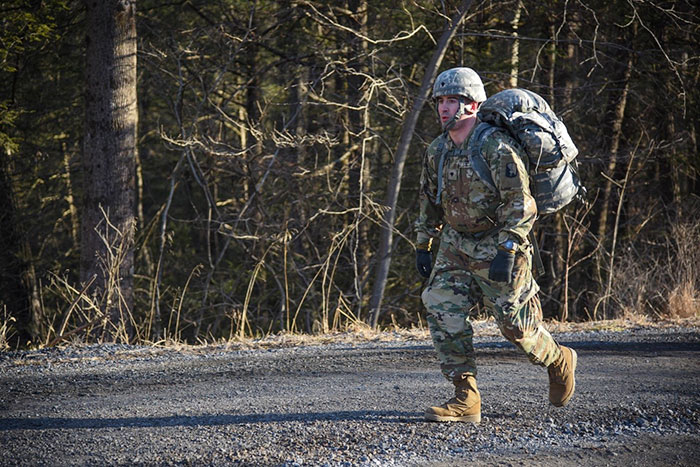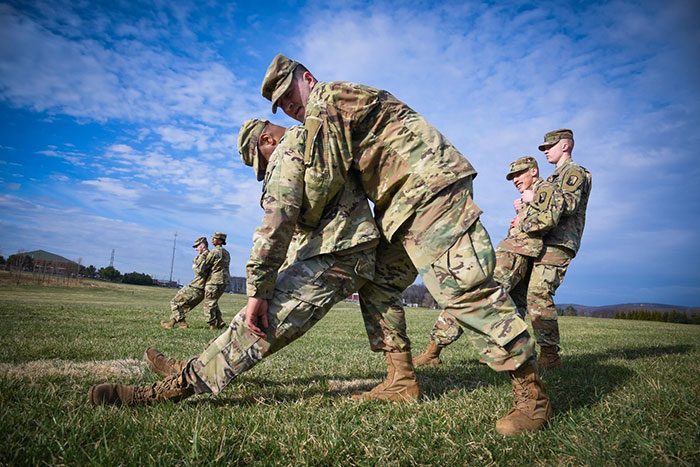A Soldier's Dreams, Destiny Merge at Fort Detrick

Sit across the table from Spc. Sergo Dzamashvili for just a few seconds and you'll see a basic outline emerge fairly quickly. His manners and easy smile, the way he leans forward when he talks, and –not least of all, of course– his affection for Starbucks Doubleshot energy drinks make him the typical –almost archetypal– 30-year-old Soldier; busy, eager, and always ready for the next task, the next challenge. But dig a little deeper and you will see, quite clearly, the details that color the world inside that simple sketch. To map the entire terrain, however, you'll need to travel some 15,000 miles.
"I always wanted to be a Soldier," says Dzamashvili, sitting in the offices of the 21st Signal Brigade on a warm September morning. "When I was a kid, that was always something I thought would be cool, being a soldier for the American Army."
Those words, and indeed his affinity for the Army and America as a whole, are repeated so often and with such calm conviction that he could almost double as a motivational speaker; one specializing, perhaps, in writing simple daily mantras for busy professionals to read on their daily commutes. Instead, Dzamashvili is a board-certified medical doctor who enlisted in the Army just last year, in early 2018. It's a commitment, he says, that doubles as a gift to the country that gave him opportunities he never would have had in his native Georgia – a tiny, still-emerging country located at the intersection of Western Asia and Eastern Europe.
"Honestly," says Dzamashvili, "the reason I wanted to become an American Soldier is because America has given my family everything."
The First 5,000 Miles
"When I was born in Georgia," says Dzamashvili, reaching back to the late 1980s, "it was still part of the U.S.S.R. This was just before the U.S.S.R. split up, and so there was instability and there was upheaval … there was an ongoing fight for power."
It was that atmosphere of decline that Dzamashvili's father, Konstantin, sought to flee when he reached out to a friend living in Chicago for help in the early 1990s. Political and cultural strife in the country of –at the time– barely more than four million people had led to the breakdown of living conditions and, in some cases, the basic application of law. And so Konstantin, a neurologist by trade, was hoping America could provide safety for his wife, son, and young twin daughters.
"My father was waiting in breadlines for hours just to feed the family," says Dzamashvili. "So when he came here, it was for a better life."
But that opportunity came with a catch. In order to pay for his family's move to America, Konstantin had to travel to the U.S. alone first in order to save up enough money. He wound up bunking with that same buddy in Chicago for a year –eventually re-starting his medical career at 40-years old– before bringing the rest of the family to Illinois.

Says Dzamashvili of his father, "He was out there for a year, alone, while we were still in Georgia, until he had passed all his boards and started his residency program, which would then fund us coming over here."
And so at age five, Sergo was finally in the place he wanted to be all along … for a little while, at least.
Return to Georgia
For Sergo, it all started with his grandfather – his father's father. He was the catalyst, the inception point. He passed away when Konstantin was in his late teens and so Sergo never got a chance to meet him, but he did have pictures – volumes of mementos from Georgia.
"I would always hear stories about his bravery," says Sergo, "about what kind of man he was. From early on, I was always intrigued – the way he was standing there in his [military] uniform with all these medals."
Those pictures, coupled with Sergo's newfound affinity for the United States, stuck with him during his formative years and carried through to his entrance into medical school – which he ultimately chose to attend at David Tvildiani Medical University back in Georgia.
The decision to both leave home (to leave again, in a manner of speaking) and reconnect with family roots was daunting to say the least, as Georgia had been rife with the same political instability from Dzamashvili's youth up until pro-democratic forces rose to power in the mid-2000s. The tiny, burgeoning country was still –much like Sergo at the time– moving through its adolescent years.
There was contrasting comfort, however, in the medical training itself. Turns out Dzamashvili's chosen university not only came highly recommended from family friends practicing medicine in Chicago, it was designed specifically to cater to regional students who wanted to ultimately enter U.S.-based medical professions. To that end, all university textbooks were written in English and, further, the overall cost of schooling was substantially less than a U.S.-based medical education – all perks unavailable to his father just a decade-or-so earlier. Ironically, Georgia would eventually, in 2014, become home to the U.S. Army Medical Research Directorate-Georgia, a subordinate command of the USAMRDC's Walter Reed Army Institute of Research.
"Going back to Georgia really brought me that perspective," says Dzamashvili. "There was a long time where my family wouldn't go back, even though we had a chance to go back in the 90s."
Just twelve years after touching down in America's Heartland –and just a few years after becoming an American citizen– Sergo was back on a plane at age 17 for a new and different journey.
Homecoming, Part II
When you ask him how Georgians speak –ask about the language they use, the way they talk, the casual slang terms they use, even– Dzamashvili is quick to make it clear that Georgia is a singular and unique entity; a hard-fought identity that he clearly still respects.
"Georgians have their own language," he says quickly, almost as a sly-but-gentle rebuke to those who think the country may still be hindered by its turbulent past in any way. "They have their own alphabet, everything – and so I had to re-learn how to read and write, essentially, when I went back for school."

Dzamashvili's university stay would last for six years until his graduation in 2013; at which point he'd not only navigated the rigors of initial medical training, but had reached a poignant understanding of the country of his birth ("people there are very hospitable," he says), gained a greater understanding of the government's democratic efforts ("I see hope," he says), and, with regards to cultural differences, had also determined that Georgia had substantial culinary shortcomings as compared to the U.S. ("I did miss burritos over there," he says).
Touching back down in Illinois, Dzamashvili eventually passed his medical board examinations, shadowed professional doctors, and even performed clinical research at Edward Hines, Jr. VA Hospital. But when it came time for residency training, instead of waiting a year to attend either Loyola University of Chicago or the University of Illinois at Chicago, he opted for a different path: the U.S. Army.
"Screw waiting," says Dzamashvili of his mindset at the time. "I'm going to join the Army. I was always told the fastest way to get into the Army was to just go and enlist anyways, so that didn't bother me to go enlist for a couple of years as long as I got into the medical field."
Desire, Meet Destiny
Now, after thirty years and medical training efforts on two different continents, Sergo Dzamashvili is both a medical doctor and a member of the U.S. Army; his first assignment is here at Fort Detrick. His unique qualifications have bred an understandable eagerness to move forward –a chomping at the bit, of sorts– as, indeed, he's already started the process of entering the Army's medical occupation; taking the steps required to become a physician. But if you think the man who's waited nearly three decades to realize his dream is put off by a little time in the waiting room, then you don't know Sergo.
"My ultimate goal is to practice medicine in the Army," says Dzamashvili. "That's what I want, to give back. I'd like to serve for at least eight years, to give back that entire time in service."
Just how long it will take to reach that goal is yet to be seen, though it should come as no surprise that Dzamashvili has already attempted to plot the arc of his military medical career even before his training has been completed. Even now, serving as a Human Resources Specialist in the S-1 Office until his next assignment, he finds in each day's shift what so many others would gladly welcome into their own lives: a sense of purpose, the feeling of belonging, and the satisfaction of a job that truly has meaning.
In the end –if these kinds of stories can have an end– the service career of Sergo Dzamashvili is, in reality, just beginning. It would be an exaggeration, perhaps, to say that Dzamashvili has already lived multiple lives; though it wouldn't be such a stretch to say that's the truth, either. In any capacity, his life's work as currently constructed already stands as an impressive feat; a Soldier coupling the desire to serve America with the talent required to make a lasting impact.
Not too bad for a typical 30-year-old.
Says Dzamashvili, "If there's nothing else I do in my life, I can always say I was a Soldier. That's the way I look at it. If there's nothing else that I accomplish, I will always know that I served my country."
 An official website of the United States government
An official website of the United States government
 ) or https:// means you've safely connected to the .mil website. Share sensitive information only on official, secure websites.
) or https:// means you've safely connected to the .mil website. Share sensitive information only on official, secure websites.


